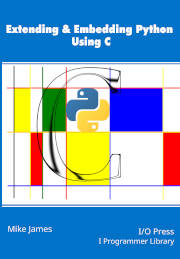Page 96
example.c
This is the combined code from the chapter - the json files are as for example given ealier
#define PY_SSIZE_T_CLEAN
#include <Python.h>
static PyObject *Attributes1(PyObject *self, PyObject *args)
{
PyObject *myObject;
if (!PyArg_ParseTuple(args, "O", &myObject))
return NULL;
PyObject *attribName = Py_BuildValue("s", "myAttribute1");
PyObject *myAtt1 = PyObject_GetAttr(myObject, attribName);
Py_XDECREF(attribName);
return myAtt1;
}
static PyObject *displayAttributes(PyObject *self, PyObject *args)
{
PyObject *myObject;
PyObject *myString;
if (!PyArg_ParseTuple(args, "OO", &myObject, &myString))
return NULL;
PyObject *myAtt1 = PyObject_GetAttr(myObject, myString);
if (PyUnicode_Check(myAtt1))
{
const char *mytext = PyUnicode_AsUTF8(myAtt1);
printf("%s\n", mytext);
}
if (PyLong_Check(myAtt1))
{
int myValue = PyLong_AsLong(myAtt1);
printf("%d\n", myValue);
}
return myAtt1;
}
static PyObject *Attributes2(PyObject *self, PyObject *args)
{
PyObject *myObject;
if (!PyArg_ParseTuple(args, "O", &myObject))
return NULL;
PyObject *newValue = PyLong_FromLong(42);
if (PyObject_SetAttrString(myObject, "myAttribute1", newValue))
return NULL;
Py_RETURN_NONE;
}
static PyObject *Attributes3(PyObject *self, PyObject *args)
{
PyObject *myObject;
if (!PyArg_ParseTuple(args, "O", &myObject))
return NULL;
if (PyObject_HasAttrString(myObject, "myAttribute1"))
{
PyObject *myAtt1 = PyObject_GetAttrString(myObject, "myAttribute1");
if (PyLong_Check(myAtt1))
{
int myValue = PyLong_AsLong(myAtt1);
printf("%d\n", myValue);
}
}
Py_RETURN_NONE;
}
static PyObject *Attributes4(PyObject *self, PyObject *args)
{
PyObject *myObject;
if (!PyArg_ParseTuple(args, "O", &myObject))
return NULL;
PyObject *main = PyImport_AddModule("__main__");
PyObject *maindict = PyModule_GetDict(main);
PyObject *myclass = PyDict_GetItemString(maindict, "myClass");
if (PyObject_IsInstance(myObject, myclass))
{
PyObject *myAtt1 = PyObject_GetAttrString(myObject, "myAttribute1");
if (PyLong_Check(myAtt1))
{
int myValue = PyLong_AsLong(myAtt1);
printf("%d\n", myValue);
}
Py_XDECREF(myAtt1);
}
Py_RETURN_NONE;
}
static PyMethodDef AddMethods[] = {
{"Attributes1", Attributes1, METH_VARARGS, "an example"},
{"displayAttributes", displayAttributes, METH_VARARGS, "an example"},
{"Attributes2", Attributes2, METH_VARARGS, "an example"},
{"Attributes3", Attributes3, METH_VARARGS, "an example"},
{"Attributes4", Attributes4, METH_VARARGS, "an example"},
{NULL, NULL, 0, NULL} // sentinel
};
static struct PyModuleDef addmodule = {
PyModuleDef_HEAD_INIT,
"example",
"C library to test API",
-1,
AddMethods};
PyMODINIT_FUNC PyInit_example(void)
{
return PyModule_Create(&addmodule);
}
test.py
import example
class myClass:
myAttribute1=10
myAttribute2="Brian"
myInstance=myClass()
print(example.Attributes1(myInstance))
value=example.displayAttributes(myInstance,"myAttribute1")
print(value)
value=example.displayAttributes(myInstance,"myAttribute2")
print(value)
example.Attributes2(myInstance)
print(myInstance.myAttribute1)
example.Attributes3(myInstance)
example.Attributes4(myInstance)


